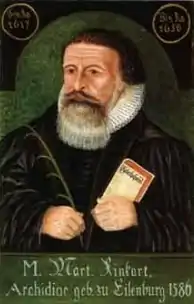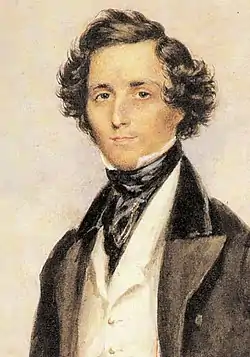Now Thank We All Our God
"Now thank we all our God" is a popular Christian hymn translated from the German "Nun danket alle Gott", written c. 1636 by Protestant minister Martin Rinkart. Its hymn tune, Zahn No. 5142, was published by Johann Crüger in the late 1640s.[1][2]
| Nun danket alle Gott Now Thank We All Our God | |
|---|---|
| Hymn | |
.jpg.webp) | |
| Catalogue | Zahn 5142 |
| Written | 1636 |
| Text | by Martin Rinkart, translated by Catherine Winkworth |
| Language | German |
| Based on | Ecclesiasticus 50:22-24 |
| Meter | 6.7.6.7.6.6.6.6 |
| Melody | attributed to Johann Crüger |
Background
Martin Rinkart was a Lutheran minister who came to Eilenburg, Saxony at the beginning of the Thirty Years' War. The walled city of Eilenburg became the refuge for political and military fugitives, but the result was overcrowding, and deadly pestilence and famine. Armies overran it three times. The Rinkart home was a refuge for the victims, even though he was often hard-pressed to provide for his own family. During the height of a severe plague in 1637, Rinkart was the only surviving pastor in Eilenburg, conducting as many as 50 funerals in a day. He performed more than 4000 funerals in that year, including that of his wife.
Rinkart was a prolific hymn writer. In Rinkart's "Jesu Hertz-Buchlein" (Leipzig, Germany: 1636), the hymn appears under the title "Tisch-Gebetlein", or a short prayer before meals. The exact date of "Nun danket alle Gott" is debated, but it is known that it was widely sung by the time the Peace of Westphalia was signed in 1648. Johann Crüger published it in the 1647 edition of his Praxis pietatis melica.
Text

Below is the text in a modern version from the German hymnal Evangelisches Gesangbuch,[3] and a 19th-century translation by Catherine Winkworth:[4]
Nun danket alle Gott |
Now thank we all our God, |
Der ewig reiche Gott |
O may this bounteous God |
Lob, Ehr und Preis sei Gott, |
All praise and thanks to God |
Melody

The melody is sometimes attributed to Rinckart,[5] but it is usually considered to be by Johann Crüger,[6] who first published it.[2]
Musical settings
It is used in J.S. Bach's cantatas, such as BWV 79,[7] 192 (music lost), harmonized for four voices in BWV 252 [8] and 386,[9] and set in a choral prelude, BWV 657, as part of the Great Eighteen Chorale Preludes.[10][11] The now-standard harmonisation was devised by Felix Mendelssohn in 1840 when he adopted the hymn, sung in the now-standard key of F major and with its original German lyrics, as the chorale to his Lobgesang or Hymn of Praise (also known as his Symphony No. 2).
Max Reger composed a chorale prelude as No. 27 of his 52 Chorale Preludes, Op. 67 in 1902. The late-Romantic German composer Sigfrid Karg-Elert used it in his Marche Triomphale. In 1969 Mr. Jo Mama also used Martin Rinckart's hymn to write a song entitled We Must Rejoice. ("For 2 tubas, 2 violas, and Organ with vibraphone"). John Rutter composed Now thank we all our God for choir and brass in 1974.[12] In 1977 Czech-American composer Václav Nelhýbel arranged a contemporary setting entitled Now Thank We All Our God: Concertato for 2 trumpets, 2 trombones & Organ with Tuba and Timpani which incorporated Nun Danket Alle Gott for congregational singing.[13][14][15] Hermann Chr. Bühler made an elaborate setting of Johann Crüger's version.[16] It is often used in Christian weddings and other joyous religious ceremonies, and in Germany it is sung on occasions of national thanksgiving.
Leuthen Chorale
It is claimed that after the Battle of Leuthen in 1757, the hymn was taken up by the entire assembled Prussian army. This narrative is however questioned by historians and musicologists, who identify the story as a later invention of Prussian propaganda.[17][18] Because of this story the melody is sometimes known as the Leuthen Chorale.[19]
References
- "Liederdatenbank: Nun danket alle Gott". www.evangeliums.net/lieder/. Retrieved 19 February 2019.
- Zahn, Johannes (1890). Die Melodien der deutschen evangelischen Kirchenlieder. III. Gütersloh: Bertelsmann. p. 307.
- Evangelisches Gesangbuch 321 (in German) Evangelisches Gesangbuch / Niedersachsen Bremen
- Now Thank We All Our God hymnary.org
- Siegmar Keil Archived 2015-04-02 at the Wayback Machine (2005)
- Michael Fischer (2007).
- BWV 79.3 bach-chorales.com
- BWV 252 bach-chorales.com
- BWV 386 bach-chorales.com
- Stinson, Russell (2001), J. S. Bach's Great Eighteen Organ Chorales, Oxford University Press, ISBN 0-19-516556-X
- Williams, Peter (2003), The Organ Music of J. S. Bach (2nd ed.), Cambridge University Press, pp. 336–386, ISBN 0-521-89115-9
- "John Rutter / Now thank we all our God / No. 1 of Two Hymns of Praise". Oxford University Press. 1974. Retrieved 11 June 2014.
- Laster, James (2005). Now Thank We All Our God. ISBN 9780810852990. Retrieved November 25, 2017.
- Vaclav Nelhybel: Now Thank We All Our God. 1987. ISBN 9780898691511. Retrieved November 25, 2017.
- Vaclav Nelhybel: Nun Danket Alle Gott. 1987. ISBN 9780898691511. Retrieved November 25, 2017.
- Gesangbuch, Kirche Jesu Christi der Heiligen der Letzen Tage, 1977
- Hofer, Achim. "Joseph Goldes (1802–1886) Fest-Reveille (1858) über den Choral 'Nun danket alle Gott' für Militärmusik" in Peter Moormann, Albrecht Riethmüller & Rebecca Wolf eds., Paradestück Militärmusik: Beiträge zum Wandel staatlicher Repräsentation durch Musik, Transcript Verlag (2012), p. 217–38, ISBN 978-3-8376-1655-2.
- Kroener, Bernhard R. "'Nun danket alle Gott.' der Choral von Leuthen und Friedrich der Große als protestantischer Held; die Produktion politischer Mythen im 19. und 20. Jahrhundert" in Hartmut Lehmann & Gerd Krumeich eds. "Gott mit uns": Religion, Nation und Gewalt im 19. und frühen 20. Jahrhundert, Vandenhoeck & Ruprecht (2000), p. 105–34, ISBN 9783525354780.
- Overy, Richard (2014). A History of War in 100 Battles. Oxford University Press. p. 115. ISBN 978-0-19-939071-7.
External links
| Wikisource has original text related to this article: |
| Wikimedia Commons has media related to Nun danket alle Gott. |
- Evangelisches Gesangbuch 321 (melody and text in 3 languages) l4a.org
- "Now Thank We All Our God" (score and audio version) on the website of the Center for Church Music
- Hymns Without Words lyrics and recording available for download
